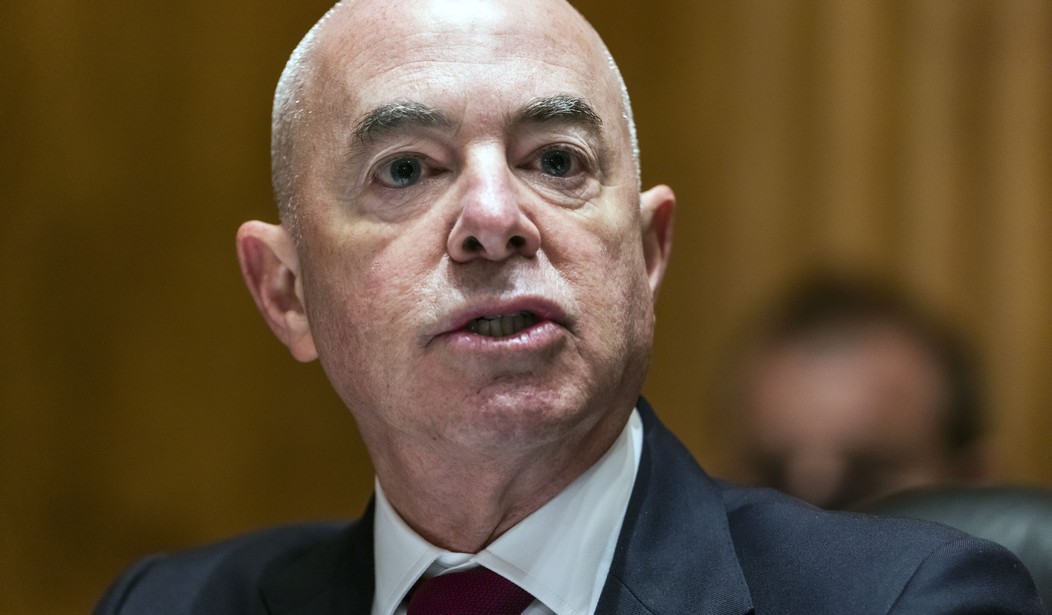DHS Secretary Alejandro Mayorkas has been impeached by the House, and now will stand before the Senate. What’s next?
According to Section 1, Clause 3 of the Constitution, “The Senate shall have the sole Power to try all impeachments.”
This particular Senate, however – controlled by a Democrat majority, under the leadership of the extremely partisan Charles Schumer of New York – does not want to try this impeachment. With the crisis at the southern border topping all issues of concern for voters in recent polling, there are vulnerable Senate Democrat incumbents in red states (Sherrod Brown in Ohio and Jon Tester in Montana) and vulnerable Democrat incumbents in purple states (Bob Casey, Jr. in Pennsylvania and Jacky Rosen in Nevada) who must be concerned that a vote to let Mayorkas off the hook could be used against them on the campaign trail.
Guarding a one-vote majority, Schumer doesn’t want to force his colleagues to cast such a vote on the record.
Already, the Capitol Hill press corps is writing about the various methods Schumer may use to avoid having the Senate do its constitutional duty to hold a trial.
For instance, writes The Hill, “[I]nsiders predict Democrats will likely try to refer the matter to a special Senate committee to review the impeachment articles. It could then come up for a vote after Election Day.”
In fact, that’s exactly what happened the last time someone other than a president was impeached by the House. In March of 2010, House managers presented articles of impeachment against federal district Judge Thomas Porteous of Louisiana. On the very same day, the Senate approved by voice vote a resolution creating a special committee to review the evidence against him and make a recommendation to the full body. That committee was evenly divided, with three Republicans and three Democrats. And here’s the kicker – the committee did not send the Senate its recommendation until December 2010, more than a month after the 2010 elections. (For the record, the committee recommended conviction, and on December 8, 2010, the Senate voted by 90-6 to convict Porteous and then voted by 94-2 to prohibit him from ever again holding federal office.)
Recommended
Then-Majority Leader Harry Reid was only able to dispense with a full impeachment trial in the case of Judge Porteous because he had buy-in from Senate Republicans. Minority Leader Mitch McConnell should not give current Majority Leader Schumer and his Democrat colleagues the same pass he gave Reid 14 years ago.
Instead, the Senate should hold a trial – and it should be the full Senate that listens to the evidence, not just a small committee. Alexander Hamilton explained in Federalist 65 that the Senate was the proper body to conduct an impeachment trial, not the Supreme Court, precisely because the Court was too small a body: “The awful discretion which a court of impeachments must necessarily have, to doom to honor or to infamy the most confidential and the most distinguished characters of the community, forbids the commitment of the trust to a small number of persons.”
If the Supreme Court with its original seven members was properly considered by Hamilton in 1789 “too small a body,” then, certainly, a committee of just six members would also fail that test.
Hamilton warned of another problem regarding the trial of an impeachment – the problem of partisanship: “The prosecution of them, for this reason, will seldom fail to agitate the passions of the whole community, and to divide it into parties more or less friendly or inimical to the accused. In many cases it will connect itself with the pre-existing factions, and will enlist all their animosities, partialities, influence, and interest on one side or on the other; and in such cases there will always be the greatest danger that the decision will be regulated more by the comparative strength of parties than by the real demonstrations of innocence or guilt.”
In other words, in order to do their jobs properly, Senate Democrats – and Republicans – should shed their partisan cloaks and think of themselves first as members of the Senate sitting as judges against an executive branch official accused by their House colleagues of a breach of the public trust, rather than as partisans whose job it is to shield one of their own.
After all, the entire point of an impeachment is to protect the body politic against the violations of the public trust committed by a member of the executive branch. This shouldn’t be Democrats vs. Republicans, it should be legislative branch vs. executive.
In that sense, a failure to convict would be a ceding of power by the legislative branch to the executive branch. Mayorkas has been impeached for “willful and systemic refusal to comply with the law.” The laws with which he refused to comply – that is, the laws he willfully failed to enforce – are laws written by Congress. By failing to enforce the law written by Congress, Mayorkas is effectively writing his own law – and in doing so, is taking unto himself a power specifically reserved to the Congress by the Constitution.
The path is clear – Senate Democrats swore an oath to support and defend the Constitution, and, therefore, to protect the legislative branch’s powers and authorities under the Constitution. In order to uphold their oaths, they must hold a full trial in the Senate and vote to convict Alejandro Mayorkas for his offenses.
Jenny Beth Martin is Honorary Chairman of Tea Party Patriots Action.

























Join the conversation as a VIP Member